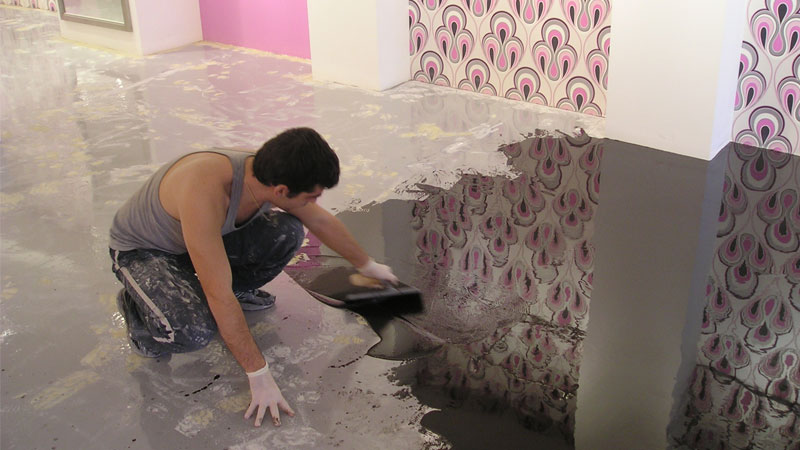
Everything that you need to know about Epoxy Floorings
Is your floor getting damaged by acid residuals or while using forklifts in your warehouse and factories? Are you looking for a solution that will keep your floors from getting damaged at a very minimum cost and can be applied within less time without creating any disturbance to your routine?
Then applying the layer of epoxy on your flooring will solve your problems. Epoxy floors are not only your floor protectors but also give an aesthetic look and feel, as they come in various colors and designs.
Advantages of installing Epoxy flooring
- Resistant to n number of chemicals and heavy mechanical process
- Available in multiple colors and designs
- Easy to maintain
- Combining with underfloor heating, you can save on external radiators
When not choose Epoxy flooring?
- Since epoxy is a rigid material, you might get irritating noise while walking.
- The floor must be even and without cracks. When we apply the epoxy to the pre-damaged floors, ripples or chips and cracks are visible.
- High re-coating costs
- It is not advisable in an environment where the floor will be wet. The epoxy floors tend to be very slippery when wet; professionals need to add another material with anti-slip properties.
- The installation time of epoxy flooring is high, and people shouldn't stay during its installation as it releases toxic compounds.
Types of Epoxy floorings
- Self-dispersing: This type of coating has anti-slip properties and good mechanical strength and is used in areas that receive frequent forklifts or food processing units where the liquids are involved.
- Self-leveling: This type of coating can be applied on both old and new concrete floors, even on cracks. Self-leveling epoxy floors give smooth and leveled surfaces to the open-cracked concrete floors.
- Graveled: Graveled epoxy floorings are known as a decorative ones. Its typical application is adding logos, brand marks, and some decorative details.
- Anti-static: In places like hospitals, labs, and buildings that manufacture electronics releases too much static electricity that can damage the electric appliances. Anti-static epoxy flooring is installed to protect the devices from static electricity,
- Flaked: When the epoxy is still wet, chips or colors can be added, giving the flooring a different look. These chips or colors are known as flakes.
Confusion between Epoxy paint coatings and Epoxy floorings
Some people use coatings and floorings interchangeably, which is further from the truth. The amount of epoxy in the coatings is way less than the flooring. The main difference between the coating and flooring is the application; applied coating's thickness is less than 2mm, whereas flooring's thickness is more than 2mm. Epoxy flooring has more temperature and time constraints, as it is built by mixing two components - Epoxy and Hardener. Even in the durability comparison, flooring wins.
Types of resins used to make Epoxy flooring.
An epoxy floor coating is made by a chemical reaction called Curing. Curing is the process of cross-polymer chain reactions between chemicals and epoxy resins (hardeners) under a required and regulated temperature. The main types of chemicals used are:
Bisphenol A:
- Widely used epoxy chemical
- Available in many molecular weights that gives versatility
- Has excellent adhesion, toughness, abrasion resistance, and chemical resistance
- When mixed with diluents and additives, the workability and adhesion is enhanced, but it lowers the chemical resistance
- At lower temperatures, the crystallization process starts.
Bisphenol F:
- More expensive than Bisphenol A
- Less viscosity means fewer additives and diluents are required, which translates to higher chemical resistance
- Lower tendency to get crystalize, but when mixed with Bisphenol A, the crystallization resistance is high
- Application - Water pipes, food packaging, plastics, dental sealants, adhesives, and liners
Novalacs:
- Expensive than Bisphenol
- Made by adding more phenols and modifying Bisphenol F
- Due to high molecular cross-link density, it has superior heat and chemical resistance, making it brittle.
Avoid choosing the wrong type of Epoxy resins and flooring by following suggestions and solutions by Chaudhary Chemitreat!!
Chaudhary Chemitreat provides high-quality epoxy flooring services that increase your building's or construction's durability, uniqueness, and longevity. Our Epoxy flooring service is a customizable solution. The epoxy resins can be customized based on your requirements of whether you want to get it installed at your warehouse, hospitals, labs, or even at your residence.
To know more about our products and services, visit Chaudhary Chemitreat Engineers, a leading AR Epoxy Flooring Solutions provider.